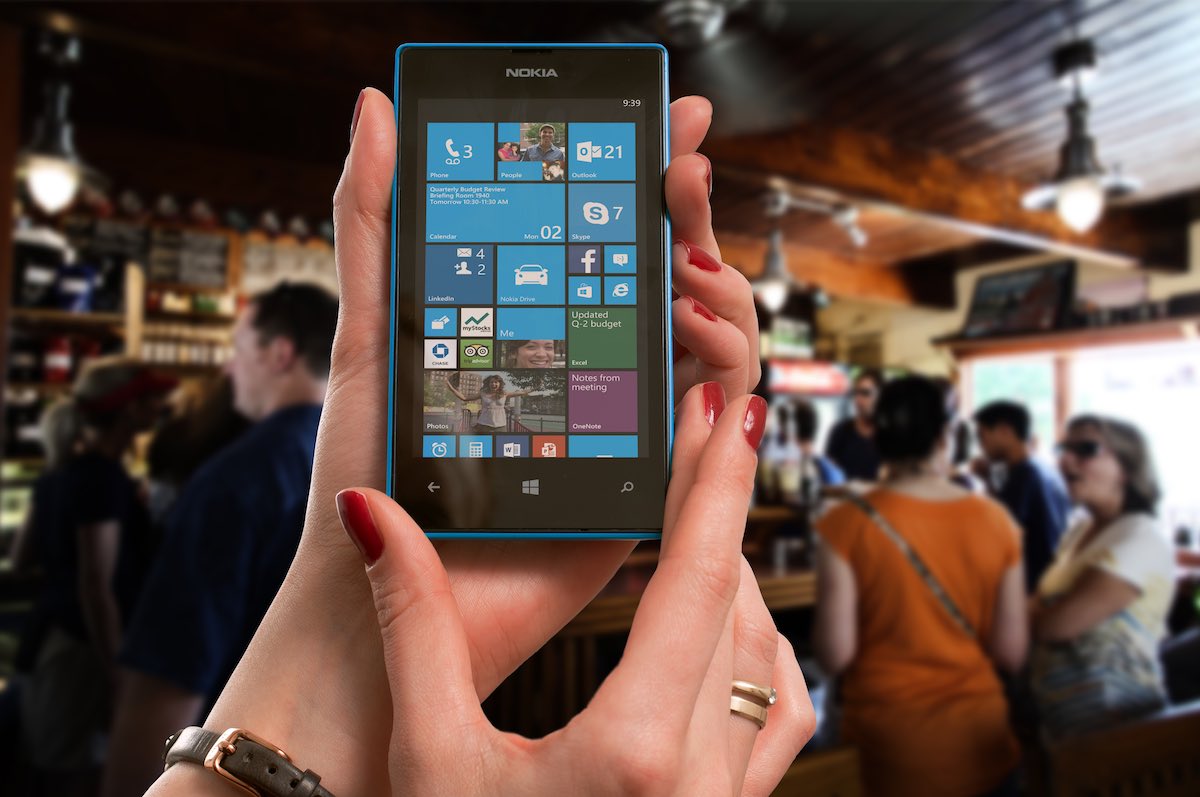I’m a little worried about the future of Microsoft.
This one story detailed how Delta Airlines, starting in early 2018, plans to replace all of their Windows smartphones and Microsoft Surface tablet devices with iPhones and iPads for their 23,000 flight attendant employees and 14,000 pilots.
It’d be one thing if Delta was a small mom and pop shop, but Delta Airlines is a global company.
Ok, sure, Delta Airlines is a big company, no question about it. But it’s still just one company, right?
Microsoft is a HUGE multi-billion dollar company and for the longest time, they were THE KINGS of technology in the entire world.
Sure, losing Delta Airlines as a major corporate client isn’t a good thing, but hey, nobody can touch Microsoft’s global operating system market share for computers. Not even the mighty Apple comes close to matching the number of Windows computers out in the wild.
So sure, losing Delta might not look good, but isn’t that still a drop in the bucket in terms of Microsoft’s overall global marketshare?
Well, one story is a fluke.
But I just spotted another recent article which explains how General Electric (GE) plans to transition EVERY SINGLE computing device which their global workforce uses, from Windows devices to iOS devices.
I just did a quick google search on the total employee headcount for GE … roughly 333,000 employees worldwide.
Yet another article states that IBM expects to have over 100,000 Mac devices in active use now, and more coming.
What is truly shocking about the IBM story is that IBM is the original company that launched the first IBM personal computer, which Microsoft targeted as their primary computing platform to write their software, and helped propel them into a multibillion-dollar juggernaut empire in the 1980s and 1990s.
And ironically, IBM was also considered public enemy number one in the eyes of Steve Jobs, back in the early 1980s. He even famously railed against the “evil empire” of IBM in his famous speech introducing Apple’s very first generation Macintosh personal computer in 1984.
Yet IBM and Apple have also announced a new partnership where IBM plans to write enterprise business applications for Apple’s iOS software platform.
I’ve been around long enough to remember when this type of alliance would have been unthinkable.
The reason I’m bringing up all these stories is to convey the point that Microsoft didn’t just lose a small customer here and there.
From what I can tell, it appears that Microsoft is losing ground in the business enterprise marketplace.
And if I were Satya Nadella, Microsoft’s current CEO, it would be keeping me up at night.
Now let’s get something clear.
I’m not saying Microsoft is anywhere near death’s door. No one who’s heavily invested in Microsoft’s software or a major financial investor in their stock should be doing any sort of knee-jerk actions like ditching their software or unloading their stock.
Microsoft is still a major, major player in the business enterprise space. And even in this day and age, Microsoft Windows computers and devices outnumber Macs and Linux/UNIX machines to such a degree, it’s still not even a contest.
That being said, I’m still worried about Microsoft’s future.
Historically, Microsoft used to dominate the personal consumer AND enterprise business market.
Not convinced?
August 24, 1995.
The official launch date of Microsoft’s Windows 95 operating system.
The Rise (and Fall?) of Microsoft
For you youngins out there, this may be hard to believe, but people used to be EXCITED about the release of new operating systems!
Not only that, people used to PAY money to get a new version of a company’s operating system.
If you wanted a consumer copy of Microsoft’s Windows 95 operating system, you’d have to fork out $89.95 for Microsoft’s shiny new 32-bit GUI operating system. You needed to purchase it as an off the shelf boxed product from a brick & mortar store (internet download? hahaha, yeah right, dream on, kid!), take it home, manually install all the discs to your personal computer and pray to the techie gods that everything went smoothly.
I know it may seem strange to a lot of people who weren’t of age back then.
We take for granted that many software services and apps don’t cost anything to purchase… your personal e-mail account, your web browser, and lots of bundled office productivity software can often be included free with the purchase of a new computer.
When I purchased my MacBook Air laptop, it came bundled with Apple’s word processor, spreadsheet and presentation software, absolutely free.
If I like Google’s products and services, I can use Gmail for my e-mail, Google Docs for word processing, and Google Sheets for my presentation software needs.
And because it’s all browser-based, I can basically use any computer device on the planet that has an internet connection, and use it all at no cost.
And the thing that should be concerning Microsoft the most about this?
Well, there are actually several things. Firstly, it’s a very popular service. Many people like the fact that it really doesn’t matter what kind of computer or operating system your machine is using. As long as you have any decent modern web browser, you have everything you need for all your software productivity needs.
Secondly, and more important, Google has managed to perch itself as the king of the internet.
Many people around the world rely on Google’s search engine and productivity software for their primary computing needs.
And they’ve been able to attract a huge army of software developers to develop internet-based apps for the web and Android, their hugely popular mobile device operating system.
Apple has also attracted its own huge army of software developers to develop for their Mac computers, but more importantly, for their iOS software platform, which runs Apple’s smartphone and tablet devices, iPhone and iPad.
What Google and Apple are essentially doing, is something that should be terrifying Microsoft.
They’re swaying software developers to write software for their operating systems and ecosystems.
So why is this important?
It’s the reason why Microsoft was able to dominate the operating system market in the 1980s and 1990s. They were successfully able to attract lots of software developers to write software for their Windows operating system because of the quality of their software development tools.
I can personally attest to this. One of their flagship development packages, Visual Basic, attracted many new people to software development, including myself, because it created such an easy to use programming environment to develop software.
In fact, I have Microsoft and its flagship quality software development products as the foundation of my entire professional software programming career.
This also helped Microsoft dominate the business enterprise market, as many companies saw how attractive Microsoft’s development tools were, and used them to write custom business applications for their needs.
And for the longest time, this helped Microsoft attain domination of the personal consumer AND business enterprise market.
The Future of Enterprise Tech
But then the internet happened and Apple released their first iPhone, creating two huge new software markets that didn’t require Microsoft’s development tools or Windows operating system.
Not that Microsoft hasn’t tried to compete with Google and Apple. Microsoft developed their own search engine, Bing, to compete with Google, and their own mobile phone and tablet device hardware to compete with Apple’s own iPhone and iPad devices.
But it’s not going well.
It’s clear by the sales numbers that personal consumers aren’t purchasing many of Microsoft’s smartphone and tablet device hardware. Apple is clearly dominating this market space.
And because of this, and the BYOD (Bring your own device) policy, which many companies and organizations are allowing, many employees are using their own personal computing devices for work purposes.
And what are most people using, in terms of mobile devices? Either Apple’s or Google’s mobile devices.
Ultimately, this is translating as encroachment into Microsoft’s once-dominant position in the business enterprise market.
So many employees and execs love their iOS and Android devices, that they are practically DEMANDING to use these devices at work.
And the big loser behind all this new momentum to use non-Microsoft hardware is of course, Microsoft.
Which helps to explain why we’re starting to see these news stories about big corporations abandoning Microsoft’s Windows operating system powered machines and migrating to iOS and Android and internet-based applications.
And I’m not seeing anything indicating this trend is just a one time fluke. And when you take away the personal consumer AND business enterprise dominance, Microsoft won’t have much standing power left in the technology space to do business, will they?
I HOPE I’m wrong. I’m one of the biggest fans of their software development tools and ecosystem. I have them to thank for helping to build my professional software development career.
But if they don’t start turning this trend around … well, I’ll cross that bridge if and when we get there. But it’s not a pleasant thought.
Come on, Microsoft, I’m rooting for you.




